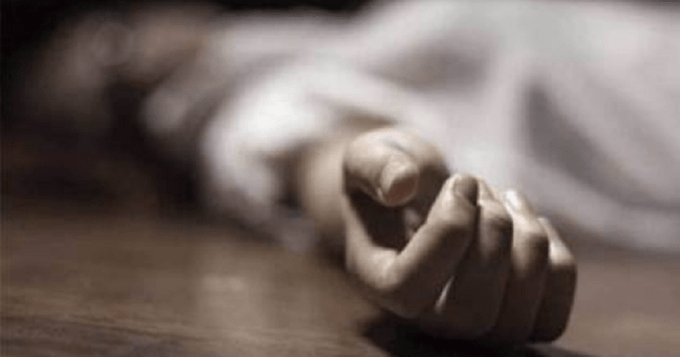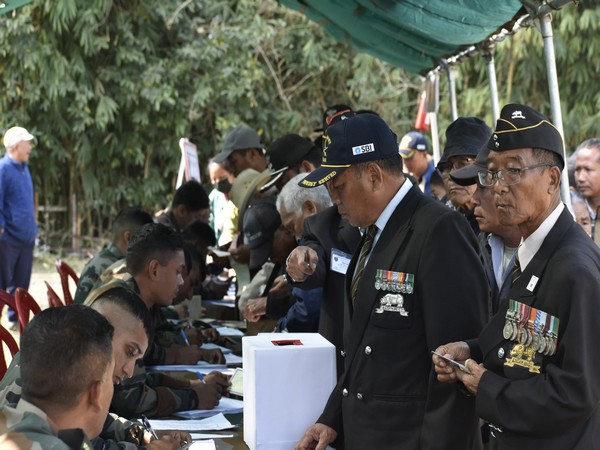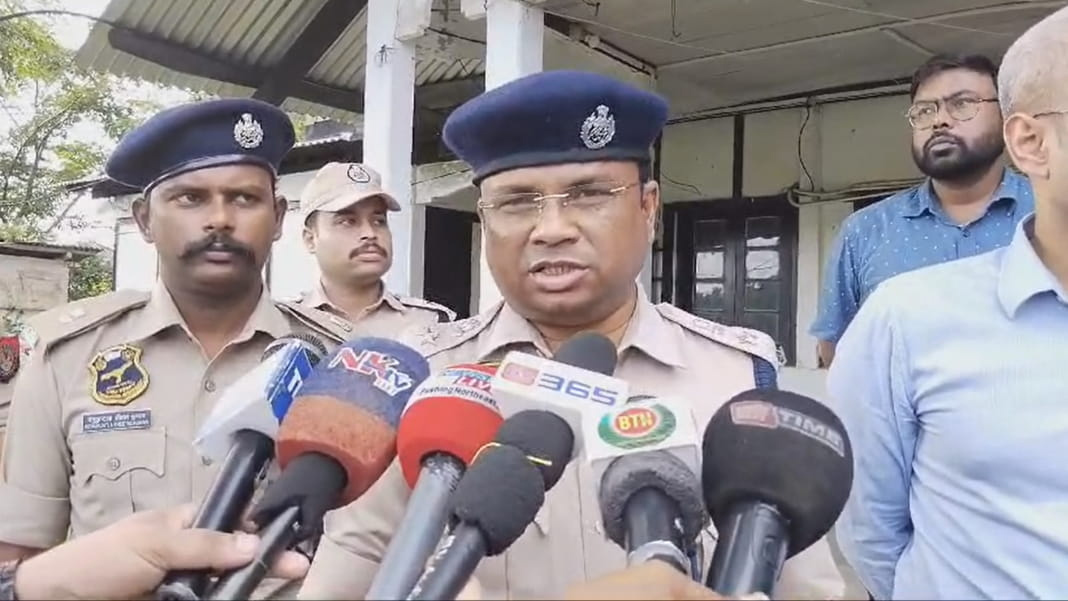Let’s not forget that Nurses are the heart of every health care system; they are that foundation which would bring new hope to humankind
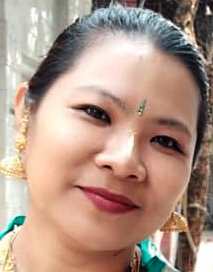 Mayanglambam Merina
Mayanglambam Merina

“Ema ! I want to become a nurse” a 12-year girl told her single mother who was selling tomatoes in the market. Hearing this, one of the customers said, “’I am a single mother of two and a nurse, whose work has been always taken for granted by the management. A starter gets Rs. 3000/-. Now I have reached Rs. 7000/-”.
Their short abrupt dialogue in the roadside market caught my attention one day during the pandemic period. Neither did I bother to ask her number nor her address. I came back hurriedly after stuffing some cabbage and cauliflower inside my thick dirty market jhola.
I still remember the pain in her tone and spent time in the last few months pondering the issues with nurses, their services and their salary structure. Never did I realise that this would be my story.
2020!!! Yes, I am talking about the year 2020 which gave hope to the health sector celebrating the International Day of the Nurse commemorating the 200th birth anniversary of a vibrant woman, Florence Nightingale. The World Health Organisation (WHO) had joined with numerous groups to acknowledge the incomparable duties and essence of nurses who are sacrificing their valuable time for humanity.
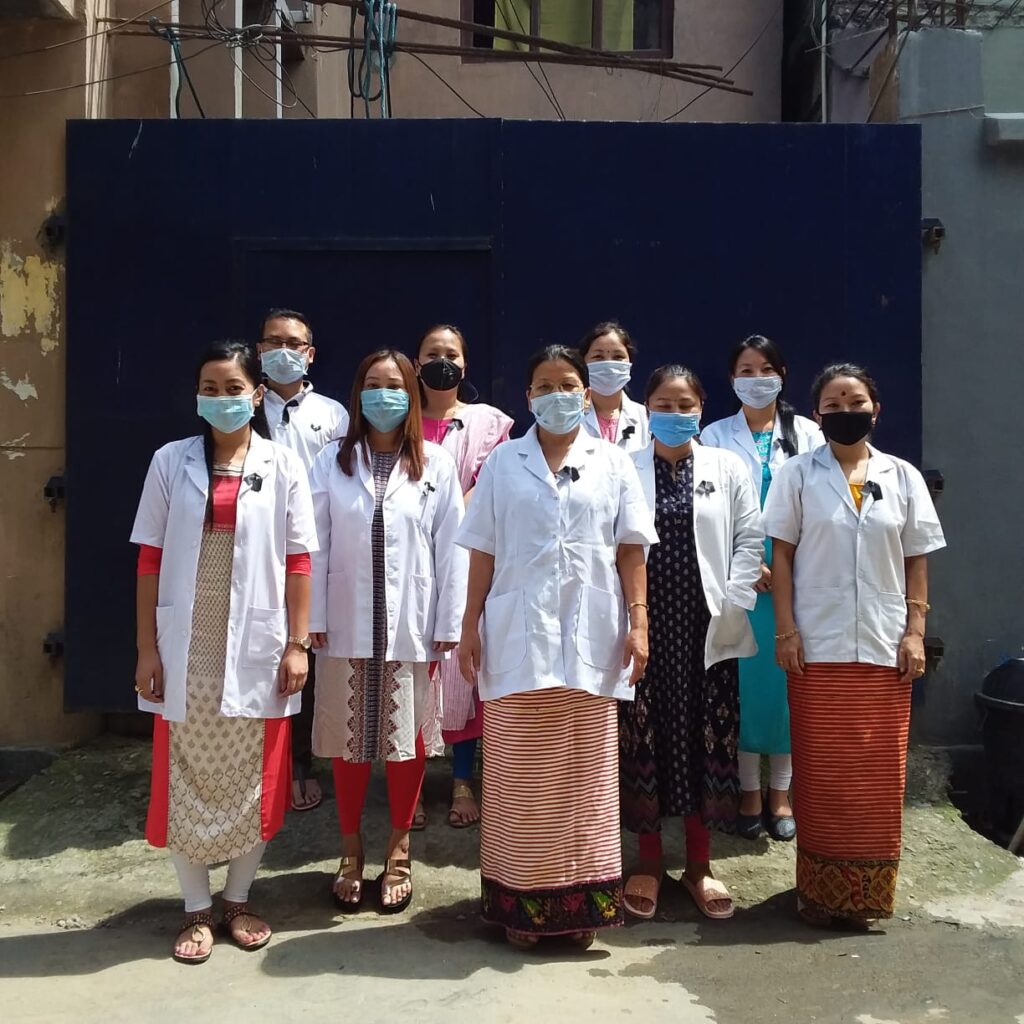
The Theme “Nursing the World to Health” came as an action from the first case of COVID-19 from Wuhan, China. No one did ever dreamt that such things would spread like a wildfire and the world will be in a global health crisis.
The role of health workers can’t be even measured through any parameters by anyone until date. Many join this profession for their innate passionate nature. But now the condition of the healthcare system has somewhat become like a mushrooming business almost in all parts of the world. No matter how/what the situation may be, they are and will always be there running around to save lives.
Coming to a state like Manipur with just a population of 3,091,545 by May 2020, as per the AADHAAR India, with a total area of 22,327 sq. km, we happily celebrated a Green Zone on April 20, 2020, when the two first cases of COVID-19 became negative after being treated at JNIMS (The Jawaharlal Nehru Institute of Medical Sciences (JNIMS). The second case was of a 65-year-old man who contracted the disease from the Tablighi Jamaat event in New Delhi’s Nizamuddin area within March 13-15.12 of them attended this event just before the Delhi government prohibited public congregation or events before the Union government’s declaration of Janata Curfew and nationwide lockdown on March 25.
The State had a second issue on May 2, 2020, to arrange for 40,000 Manipuri’s, both working and studying outside and stranded in other states, trying to get back home. Some came back permanently and some were still working online from home up till date this article is written.
Price of vegetables reached the sky raised vegetable rates; unavailability of three-layered mask/sanitisers, less stock of medicines and a heavy heart in all were seen very clearly. Individual entrepreneurs started making masks; some started supplying the cotton ones when some couldn’t even get a single one. Filthy businessmen minted money by selling and reselling stocked masks are some of the tragic shots which these eyes saw uninterrupted.
Cases of deaths and infected ones were the talk of the town. The piercing siren from the non-stop trip of ambulances gave a jerk to all our spines.
Regional Institute of Medical Sciences (RIMS, a central government hospital) and Jawaharlal Nehru Institute of Medical Sciences, JNIMS (state hospital) were the only hope for positive cases. Covid-19 Community Centres were set up for those 40 thousand returnees; the nation’s first dedicated quarantine centres for LGBTQ+ communities came in with the help from the Social Welfare Department. Soon in early August, we received news of cases of community transmission. The State Government tried controlling the narrative by coining it into ‘Local Transmission’ which confused the public even further.
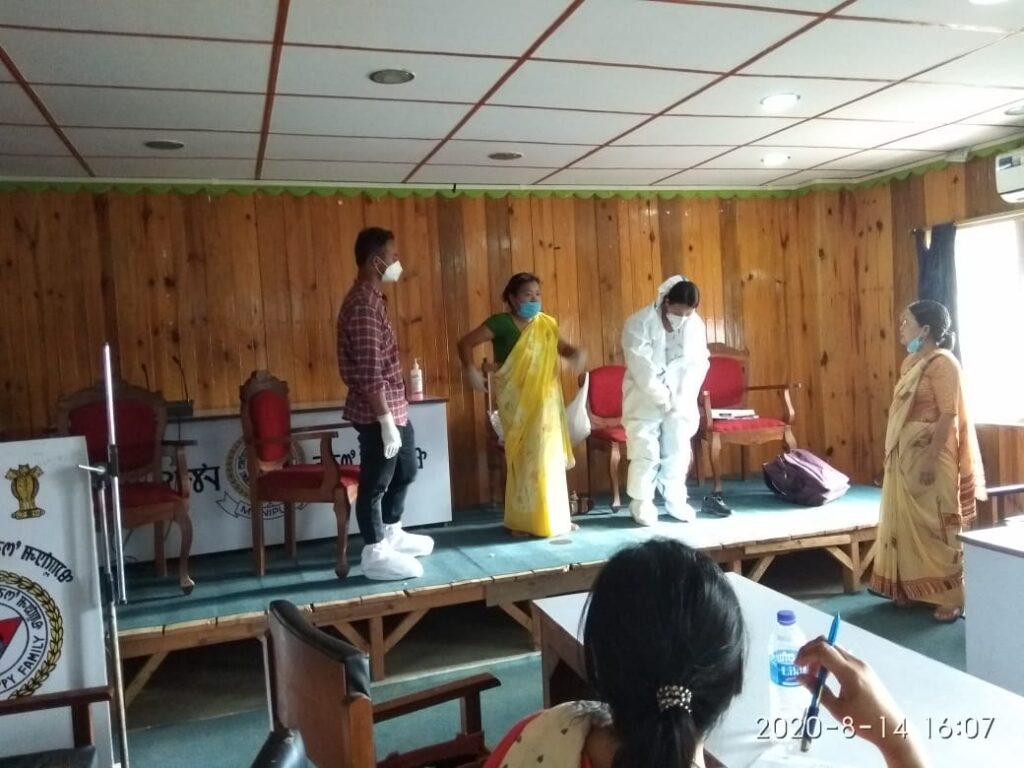
State Government Nurses and other health workers voluntarily shared their unheard experiences. Some were not ready in mind but yet forced to jump into a situation to act to serve. Full credit goes to the thorough rigorous workshops conducted in a timely manner by Manipur Nursing Council in coordination with the Trained Nurses Association of Manipur State Branch. This gave birth to the first five Nurses on the last days of March 2020, who became experts in conducting various awareness and workshops to different nursing and health centres voluntarily. Later on 4th April 2020, Manipur Nursing Council reached out to the State Health Medical Department requesting for PPE, facemasks, hand gloves and sanitizers for further training.
Secretary TNAI (Trained Nurses Association of India) Sister Th. Binodini was one among these five experts who shared her struggling work schedules between the ART centres(Anti-retroviral therapy), RIMS and awareness programmes to different nursing staff centres on basic SOP’s.
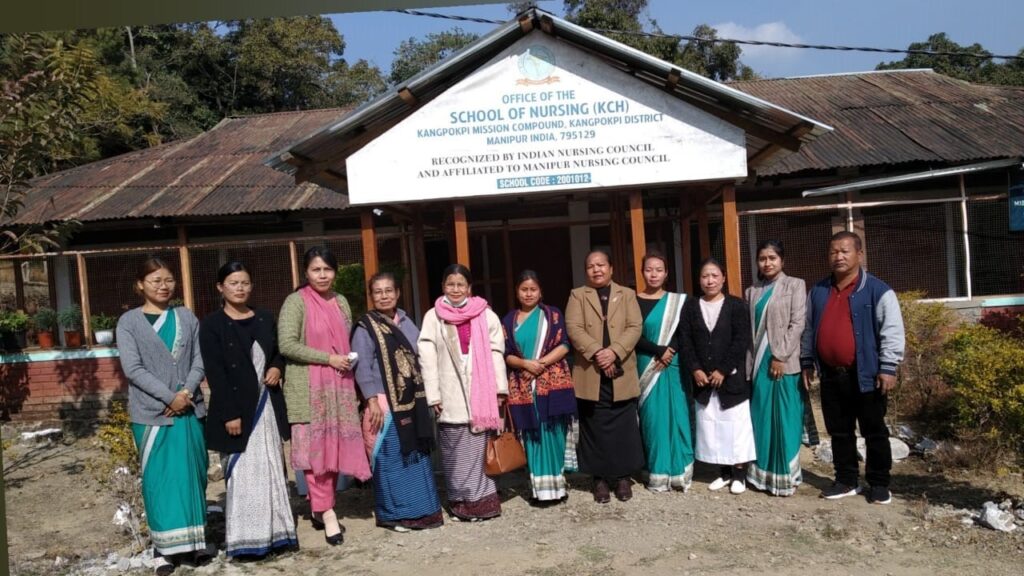
Nurses were struggling with shifts and hardcore duties but the situation was worse for those in private hospitals where some were paid less and some were just making basic pay. The constant hurdles and voices from these nurses were not reported officially but verbal telephonic complaints came pouring into TNAI officials.
One 39yr old female nurse stated, “We heard that the Supreme Court has given an order supporting us and our work, but when will these become real? I feel suffocated and want to end my life thinking why I chose this profession? If the guidelines become in action then most of the parents will encourage their children to opt for this profession soon. We are not less than others. Our parents want us to live a normal and happy life.”
After intervening into this matter and getting through TNAI President, Manipur branch pointed out that a committee had been constituted by the Ministry of Health and Family Welfare, following a case TNAI filed in a Writ Petition to the Supreme Court dated 29/01/2016 in W.P.(C). No. 527/2011- for the protection and safeguarding the interest of Nurses working in Private hospitals /Clinical Establishments clearly stated that a committee to be formed within 4 months (from 25th September 2016) to look into the safeguard for the nurses working in private hospitals or clinics. A recommendation of the committee approved by the competent authority was even forwarded to all States/UT’s for formulating the legislation/guidelines in favour of the nurses working in private hospitals/institutions. Later the committee after examining all the information collected from various states, AIGNF (All India Government Nursing Federation), TNAI felt that services were taken in full swing but adequate salaries and basic facilities were not provided. Some had a pathetic situation too.
Talking to TNAI Head, Manipur said, ‘ In case of more than > 200 bedded hospitals, nurses salary should be at par with the State Government nurses given in the concerned State/UT for the similar corresponding grade. In case of more than > 100 bedded hospitals, nurses working in private hospitals should not be paid lesser than 10% of the similar corresponding grade. In case of 50-100 bedded hospitals, salary should not be lesser than 25% of the similar grade. Our private nurses should not be paid less than 20000/- pm in any case, even for less than > 50 bedded hospitals. These are all in comparison to the salary of State Government Nurses in concerned States/ UT’s.’

Another representative of TNAI pointed out that, “the working conditions, leaves, working hours, medical facilities, transportation, accommodations, etc given to private hospital nurses should be at par with the benefits granted to the State Government nurses working in the concerned States/ UT’s’ as mentioned in the order paper.”
TNAI shockingly stated that the fixed salary according to the recruitment notice is much lesser than the minimum monthly salary fixed by the Supreme Court, even for private clinics. As to the Government recruitments, the nurses were eligible to get their starting salary of regular staff nurses in Government service in Manipur.
Further, the judgement from SC clearly accepted nurses working in private hospitals to be paid at par to the Government hospitals. The judgement also stated to take serious actions against hospitals or nursing homes insisting on bond from nurses working in their hospitals. If such things happen, then it is illegal and unconstitutional which was stated clearly on the Writ Petition date 29th January 2016.
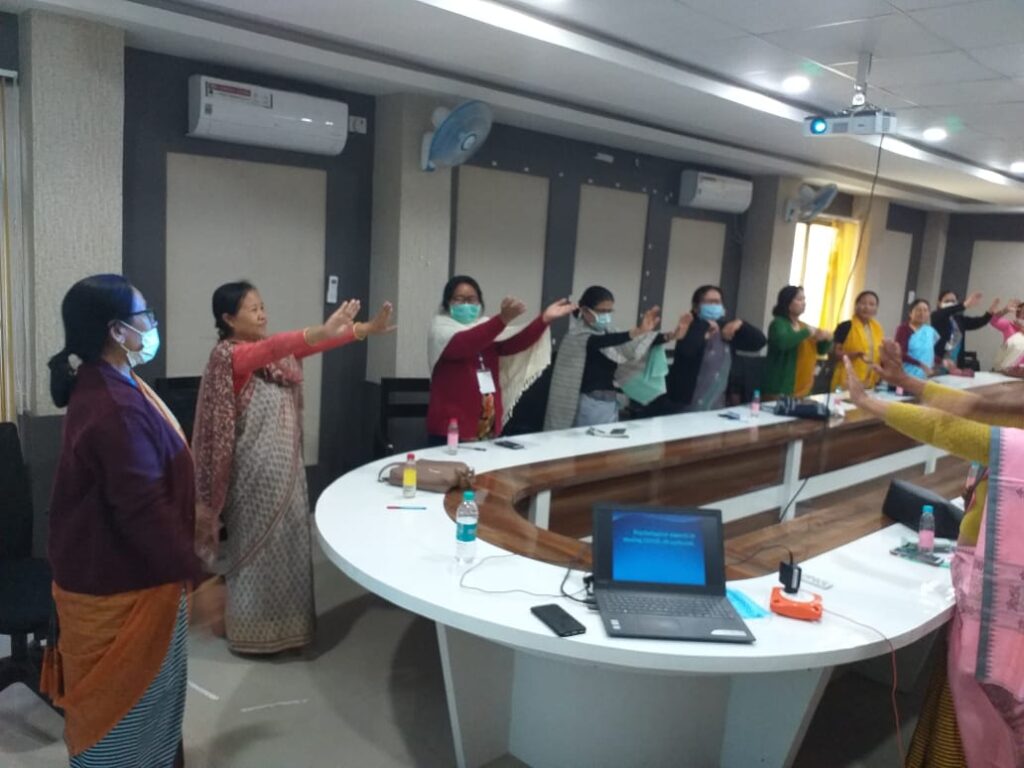
The situation was not very different for Manipuri nurses working out of the state. May 20th 2020, 300 nurses resigned one after another after facing racial slur and harassment from private hospitals in Kolkata. Traumatized by the taunting rent owners, with forced lesser pay and non-stop duty schedules made their working conditions intolerable. Wages were paid for only 15 days and the remaining 15 days were stopped because they had to be quarantined. Harsh localities called them as’ ‘GO CORONA’ when went out for grocery and vegetable shopping.
I struggled to get their interviews out of 18 nurses only one responded to ‘Hello!’, my only word. She sobbed at the other end expressing, “India being a democratic country, why are hurting words and statements given to our people? Being born with small eyes and a flat and broad nose, is it our fault? Why don’t people appreciate our devotion and loyalty towards our work? We are not Chinese. We are also Indian”. After the call, I didn’t bother to request for her name. But felt at ease that she had an ear to listen to her concerns. The only way was to console her that things would be brighter in the coming days. At times when our pen stops, our hearts still feel the pain.
I went on hunting for cases from other cities which were there but those nurses were reluctant to report. The shocking part was when a 6th-month-old pregnant nurse working at a private hospital was refused to be admitted at her hospital she worked for. But luckily TNAI intervention saved her.
Meeting TNAI Manipur President N.Tangbi, gave another turn to my story. In her words, “female ANM (Auxiliary Nurse Midwifery) came into the picture way back in 1984, it got upgraded to 2015 but since 2016 till present date, the Government hasn’t appointed proper teachers in a regular post. We, at times, hire or request senior nurses to take our classes.” She laughs.
“20000 nurses are there in Manipur but many haven’t got registered in TNAI. We have at present twenty four nursing institutes, twenty NGO run nursing schools, four Government Nursing schools. But for this pandemic period, the number does lack a lot because after every duty they have to go for 7-day quarantine and later 14 more days quarantine if needed. Only after that, they can resume their work. So substitute nurses become a serious challenge.”
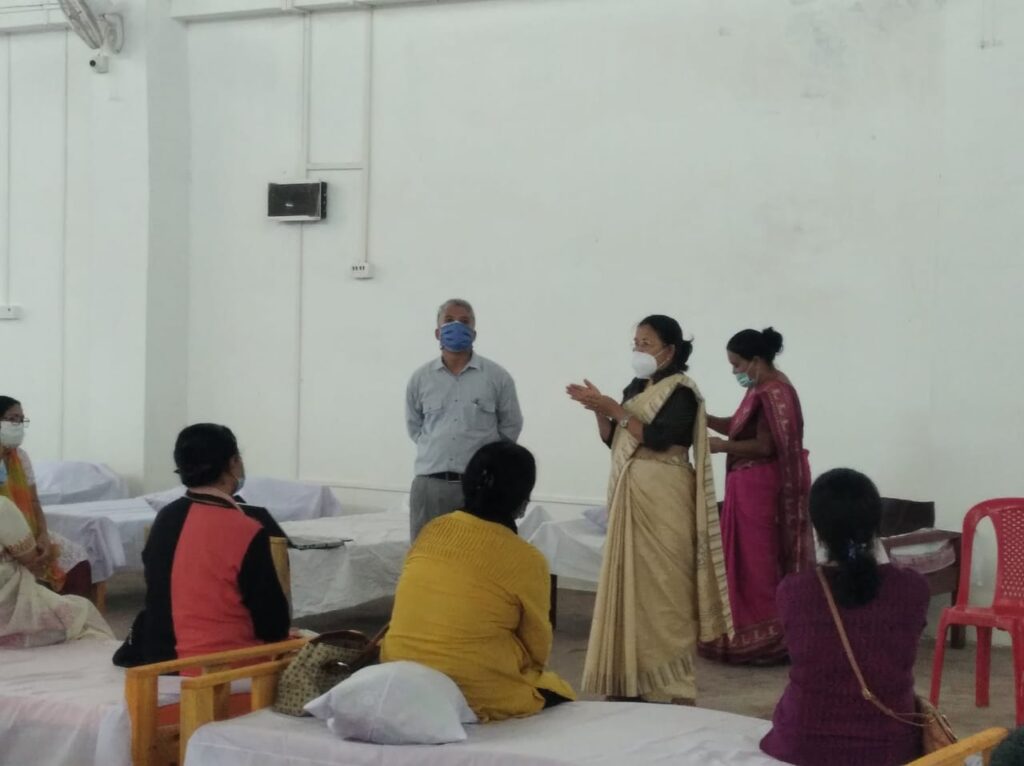
“Manipur still lacks more human resources and issues, miscommunication sets within the system and among the health workers. Upgrade of equipment, with specialised teaching faculties, needs to be increased. The standard teacher-student ratio is misplaced. Most of the teachers are all on contract basis and are being utilised in place of qualified teachers. An expert committee, set up by the Centre in pursuance of the Supreme Court order, had recommended a minimum wage of ₹20,000 for nurses working in hospitals with less than 50 beds. It also stated that the working conditions of nurses in private hospitals should be on par with nurses at government hospitals.’
The Supreme Court’s order related to minimum wage and working conditions of nurses in private hospitals later came as a big mockery during the second week of May 2020 where Jawaharlal Nehru of Institute of Medical Sciences advertisement of Nurses recruitment drew sharp criticism from the Trained Nurses Association of India. The advertisement came as recruitment for nurses to serve at COVID-19 Ward (ATC Block) for three months with a daily wage of 273/- daily.
This came as a big blow to the nurses and nursing profession fraternity. TNAI in its letter to the Director of JNIMS pointed out that as per the fixed-wage, the maximum salary for one month amounts to only Rs 6,825 (25×273) which is much below the minimum of Rs 20,000 per month salary fixed by the Supreme Court even for private clinics.
TNAI further urged JNIMS authority to consider the Supreme Court’s order and recommendations of the MoHFW committee for proper transportation services, accommodation with food and health insurance for the nurses who are detected with COVID-19.
Yet, the situation remains with their present wage at nearly Rs 13000/- per month, but even then some still fail to make any kind of complaint fearing that their jobs would be taken away from them at this pandemic hour.
The temporary appointment in a crisis like situation during the corona pandemic is necessary but such silly acts turn to be a big insult to nurses and nurses’ profession, despite this year being declared as the year of nurses and midwife by World Health Organisation, stated the TNAI.
Inputs from other sources and TNAI further proves that most of the nurses presently working in the private hospitals get their pay within 3000-4500 for every starter. They are being neglected and pressured to work under such violating conditions. Talking to some female nurses working in private hospitals they said, “how will our family run if we violate the management rules? Yes, we do know our rights have been violated to this extent. We are scared and helpless to make any sort of complaints. It would be great if our Government could start implementing this. If we all back off then who will serve the patients. But taking our services and our loyalty for granted like this hurt our feelings. If we raise our voice then our names would surely come up which would again bring hindrance in our work.”
37 yr old Kim from Chiru, working in a private hospital stated that, “We feel suffocated in PPE. We use sign languages inside the OT; it’s difficult to talk also. Some of the rude nature from patient parties and demeaning behaviour really hurts us. Earlier I used to travel daily 27 km up and down from home but now we have finally found a congested tiny one room where three of us are renting. All were reluctant in giving us the room. I left my sick husband and my two year old son at home. It’s unbearable not seeing my son for the past 7 months. We buy water and pool in money for our rent, life is not easy. If we don’t work who will feed my family?” She narrated her story while tears poured down her face.
TNAI strongly feels that more number of nurses working in private hospitals should start knowing their rights, and let their dedicated works be not taken for granted any more. They feel that it’s the right time for them to sign an MOU with the nurses and the concerned private hospitals so that they should not face any unhealthy situation later in their work.
On the other hand, Government Hospital nurses were also suffering but not as severe as the private hospital ones. Their nurses got proper pay with proper quarantine periods which gave them good rest to work further.
During my interview with some TNAI officials, they showed a willingness to support any nurse or nurses groups who are from private firms to come up with a written complaint which could support their movement. Without it, they are helpless to help them. They further feel that the Government of Manipur needs to formulate an MoU which has the surety to guard the nurses against any kind of atrocities.
Most of them are scared and are deprived of their rights which need to be told at the right time or else they will be exploited severely. Some of them are well educated but lack self-confidence demanding for their rights. This Covid-19 pandemic reminds of that specific vital role every nurse play in the healthcare system of a country. Without their devotion, dedication and determination, achieving the Sustainable Development Goals or any other Universal health coverage won’t be possible.
It has been ages that their work has shown many positive recoveries. Let’s not forget the 1918 influenza pandemic which was the most severe pandemic in recent history caused by an H1N1 virus with genes of avian origin.
They are often the first and sometimes the only health professional that people see and the quality of their initial assessment, care and treatment is vital. Nurses account for more than half of all the world’s health workers, yet there is an urgent shortage of nurses worldwide with 5.9 million more nurses still needed, especially in low- and middle-income countries.
Let’s not forget that Nurses are the heart of every health care system; they are that foundation which would bring new hope to humankind. Let the purpose of this article bring some ray of hope to our nurses’. Hoping the government recognizes the plight of the nurses and up with guidelines supporting the nurses and other health workers who are presently being suppressed during this pandemic period.

(Mayanglambam Merina Leimarenbi is a Manipur based journalist. This article is research supported by Zubaan Publishers-Sasakawa Peace Foundation.)

